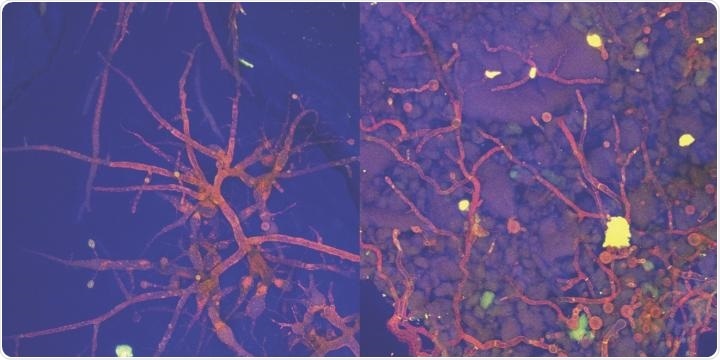Researchers have used two different transparent soil substitutes to demonstrate how soil bacteria depend on fungi to help them endure the dry periods. The study was recently published in the eLife journal.

Fungal filaments (false-colored pink) grown in liquid (left) or transparent soil (right) Image Credit: Sharma et al.
The latest discoveries indicate that such soil-like substrates may allow scientists to view the intricate interactions of countless microscopic creatures that are present in the soil. This potential is important to gain a better insight into the role played by soil and soil microorganisms in healthy ecosystems.
Scores of microscopic organisms, like bacteria and fungi, survive in the soil. These microbes are vital for healthy ecosystems because they promote the development of plants and also trap and store atmospheric carbon. However, it can be difficult to study these processes in actual soil.
To advance the study of soil processes, we used transparent soil substitutes that allowed us to use microscopes and other experimental techniques to see and measure the activity of soil bacteria and determine how this activity depends on the fungi.”
Kriti Sharma, Study Lead Author and Postdoctoral Scholar, California Institute of Technology
Sharma has completed the study while serving as a doctoral student at the University of North Carolina at Chapel Hill in the United States.
In their experiments, Sharma and collaborators from Vienna, Austria, effectively grew soil fungi and bacteria in a couple of transparent soil substitutes. One substitute was a synthetic substance known as Nafion, while the other was a naturally occurring crystal known as cryolite.
Furthermore, the team showed that a microscope could be used to observe the living microorganisms in these substitutes and that a technique known as Raman microspectroscopy could also be used to quantify the organisms’ entire metabolic activity and carbon uptake.
The researchers subsequently utilized the soil substitutes to investigate what exactly happens to the bacteria when the soil changes from the dry state and becomes wet again. The experiments demonstrated that while a majority of the soil bacteria die or become passive when the soil dries out, bacteria that live close to dead fungi continue to remain active and utilize the fungi as a carbon source.
In this way, fungi promote the activity of soil bacteria in changing environmental conditions.”
Kriti Sharma, Study Lead Author and Postdoctoral Scholar, California Institute of Technology
Described in the study, the transparent soil systems may probably be employed by several other scientists focused on soil ecology, added Elizabeth Shank, the study’s senior author and Associate Professor in the Program in Systems Biology and Department of Microbiology and Physiological Systems at the University of Massachusetts Medical School, Worcester based in Massachusetts, United States.
For example, they could be used to explore how interactions between bacteria, fungi, and other microscopic creatures living in soil help support the growth of crops. Or to better understand how carbon is stored and released from soil, which may be critical to combating climate change. Overall, these transparent soil substitutes are powerful tools that will help us answer many outstanding questions in soil microbial ecology.”
Elizabeth Shank, Study Senior Author, University of Massachusetts Medical School
Source:
Journal reference:
Sharma, K., et al. (2020) Transparent soil microcosms for live-cell imaging and non-destructive stable isotope probing of soil microorganisms. eLife. doi.org/10.7554/eLife.56275.